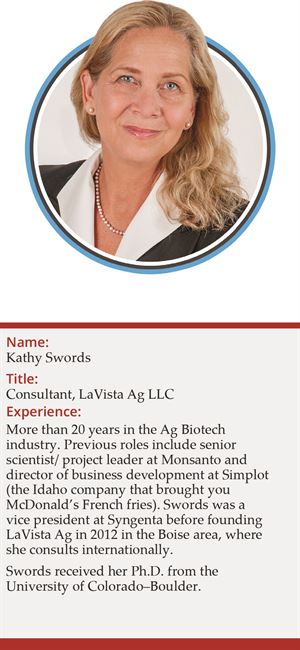 Catalyst Kathy Swords brings a wellspring of experience, a passion for patents and a ‘special affection’ for plant-microbe interactions.
Catalyst Kathy Swords brings a wellspring of experience, a passion for patents and a ‘special affection’ for plant-microbe interactions.
WARF: What excited you about joining WARF Accelerator?
KS: I think the catalytic role is ideal for me. I’ve led some big teams but I see myself more in a flat structure, punctuating what’s going on and offering five-year strategic plans. I love working at the beginning of something. I know I’m really good at that.
W: How do you approach a new Accelerator proposal?
KS: Typically I go straight to the patents and I figure out where the landscape is for each of these researchers. That helps acquaint me with the new technology. I listen to their presentation and see what’s on their radar or not. I’m treating them the same way I do due diligence with venture capital guys. It’s very interesting.
W: What is the most important message at that early stage?
KS: Practicality. That is one thing I found when I went from Monsanto into a private, family-held company called Simplot which manufactures a third of McDonald’s global French fries. When I went into the bowels of a food company, I realized that the biotech targets are wrong.
Monsanto has a particular toolbox and it was reliant on herbicide tolerance and foreign genes coming in from bacillus, from bacteria, for insect control. That was their toolbox. But in fact, the food company had a completely different set of targets that they needed to optimize and capture value in their own internal processes that was totally off the map for Monsanto. That was very interesting. Very eye opening.
W: Big picture – what is the future of agriculture?
KS: I think it’s going to be stunning. Right now, I am very interested in gene editing. I think that’s going to be huge, but I also have a deep background in traditional genetic modification and already have some feel for the limitations of gene editing.
I suspect that it’s going to be a fusion of the two. You’ll be able to accomplish a lot of basic things like enhanced crop stress tolerance or maybe some yield enhancement through gene editing. But it may have secondary consequences or you might not be able to control it in a tissue-specific manner, whereas you might be able to do that through traditional GMOs where you’re actually modulating the promoters and gene expression, tissue expression, gene silencing or overexpression.
W: Did you always want to be a scientist?
KS: Since I was little. My parents weren’t scientists. My mom was an elementary school teacher and my dad was very creative. But it was really my next door neighbors. I grew up next to UC Santa Barbara in the student community, so flanking me were the city college anatomy teacher and a postdoc in marine biology. They were the guys who gave me projects and gave me my first microscope.
W: At Berkeley you had an industry-minded advisor and that influenced your path.
KS: I feel I picked up some of the basic collaborative skills accidentally in my Ph.D. program. The question is, how do we make that more deliberate? I’ve been reflecting on those key, almost psychological, attributes. When I was inside Syngenta we talked a lot about things that make particular personalities good for making startups and people who are really steeped in innovation versus people who are more implementers.
What are those distinguishing characteristics? One thing I discovered on my team was that I had a few people who were hyper-interactors. Mapping team interactions across the company unveiled meaningful collaborations, which we could then actively support.
W: Now you’re collaborating with WARF. How is it going?
KS: WARF has really encapsulated a clear path for out-licensing, for setting up collaborations, for funding those collaborations with big companies and yet protecting the IP as well. Licensing leads are very sophisticated. Your paperwork is not convoluted and really more in line with industry standards. You’re basically a step ahead of many of the other universities.